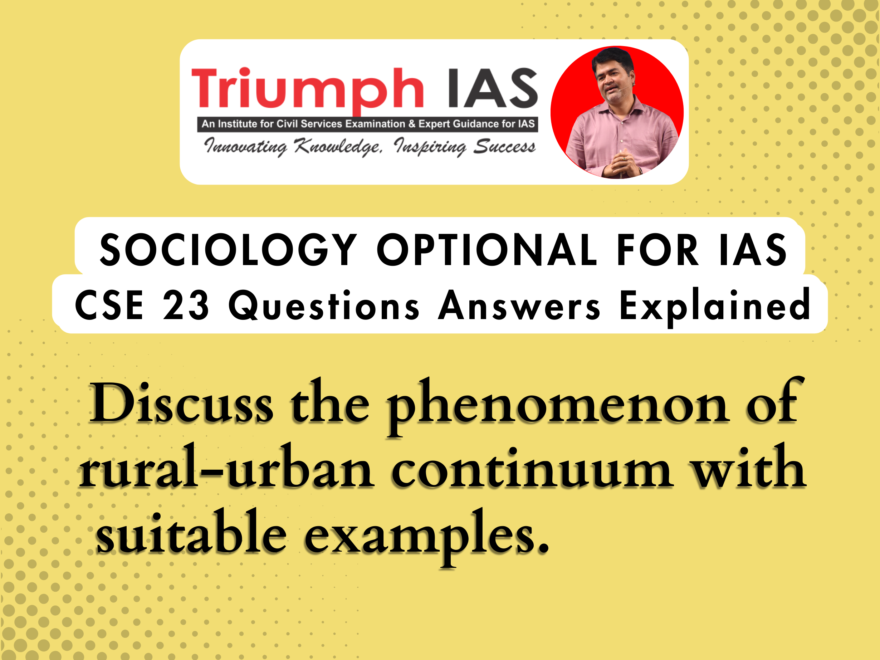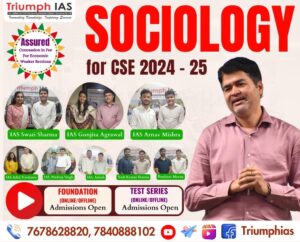Discuss the phenomenon of rural-urban continuum with suitable examples.
Section: B.
Sociology Paper 2023 Analysis.
Relevant for Paper-2 : Industrializations and Urbanization in INDIA
Question- 7 (B): Discuss the phenomenon of rural-urban continuum with suitable examples. (20 Marks)
|
Introduction: Explain the phenomenon of rural urban continuum. Main Body: Reasons of emergence of rural urban continuum and explain its consequences both positive and negative. Conclusion: Inclusive development of rural areas PURA model can be adopted to reduce dysfunctions of over burden of rural urban continuums. |
Introduction
The rural-urban continuum is a concept that emphasizes the existence of a socio-economic and cultural linkage between rural and urban areas. It suggests that there is no sharp demarcation to separate the rural and urban areas, rather a gradation from rural to urban society that can be measured and quantified. Examples of rural-urban continuum include metropolitan cities and their outskirts, where the outskirts often have a rural setting with agriculture as the primary occupation, but they are also influenced by the urban lifestyle and economy of the city.
Main Body
Several reasons contribute to the emergence of the rural-urban continuum:
- Population Growth: As populations grow, there is increased pressure on resources and opportunities in both rural and urban areas. This growth can lead to a blending of characteristics as people move between these spaces.
- Large-scale Migration: Migration from rural to urban areas is a significant factor in the continuum. People often move to urban centres in search of better employment opportunities, improved amenities, and a higher standard of living.
- Development of Industrial Towns: The establishment of industrial towns on the outskirts of urban areas contributes to the continuum. These towns often serve as a bridge between rural and urban lifestyles, attracting both rural migrants seeking employment and urban residents looking for more affordable housing.
- Improved Life Choices and Chances: Increased awareness, education, and access to information lead to improved life choices for individuals in both rural and urban areas. This, in turn, contributes to a blurring of traditional distinctions.
Positive Consequences:
- Cultural Exchanges: The continuum facilitates cultural exchanges between rural and urban populations. This interaction can lead to a richer and more diverse cultural landscape, with the sharing of traditions, practices, and ideas. Little and great tradition interactions take place. Even distant tribal areas often display a unique blend of urban, tribal, and rural cultural characteristics.
For instance: Chat Pooja is very common in metropolitans like Delhi .
- Modernization: Urbanization often brings technological advancements and modern infrastructure. As these improvements extend to rural areas, there is a positive impact on the overall quality of life, access to services, and economic opportunities.
- Accessibility to Basic Education and Health Facilities: The continuum allows for improved accessibility to basic education and healthcare facilities. The exchange of resources and ideas between rural and urban areas contributes to the development of educational and healthcare infrastructure.
- Enabling Capacity Development: The continuum enables the development of human capital by providing individuals with diverse opportunities for skill development and capacity building. This can lead to a more skilled and adaptable workforce.
Negative Consequences:
- Overcrowding in Rural Areas: Migration from rural to urban areas may result in overcrowding in rural spaces that were previously characterized by more open environments. This can lead to strain on local resources and infrastructure.
- Loss of Local Cultural Systems: The blending of rural and urban characteristics may lead to the erosion of traditional rural cultural systems. As urban influences increase, there may be a decline in unique local practices and traditions.
- Lifestyle Degradation: Rapid urbanization and the influx of urban lifestyles into rural areas may contribute to the degradation of traditional ways of life. This can result in changes to dietary habits, social structures, and community dynamics.
- Diffusion of orthodox values: O.M. Lynch has made a study in his book “Politics of Untouchability”. He found that caste panchayats like in villages existed in Agra city presenting features of continuity.
Conclusion
Acknowledging the rural-urban continuum is crucial for sustainable development. Initiatives like the Providing Urban Amenities in Rural Areas (PURA) model; proposed by former President A.P.J. Abdul Kalam, aim to bridge the rural-urban divide by providing urban amenities and infrastructure in rural areas. By adopting such inclusive development models, we can mitigate the negative consequences of the rural-urban continuum and ensure balanced growth.
Related Blogs…
To master these intricacies and fare well in the Sociology Optional Syllabus, aspiring sociologists might benefit from guidance by the Best Sociology Optional Teacher and participation in the Best Sociology Optional Coaching. These avenues provide comprehensive assistance, ensuring a solid understanding of sociology’s diverse methodologies and techniques.
META TAGS:
Taylorism, Scientific Management, Frederick Taylor, Efficiency, Standardization, Specialization, Worker Exploitation, Organizational Hierarchy, Merits and Demerits, Contemporary Organizational Functioning, Sociology Question Paper, Sociology Question Paper 2023, Sociology Question Paper CYQ, Sociology Question Paper UPSC, What is Taylorism? Analyze its merits and demerits.
Why Vikash Ranjan’s Classes for Sociology?
Proper guidance and assistance are required to learn the skill of interlinking current happenings with the conventional topics. VIKASH RANJAN SIR at TRIUMPH IAS guides students according to the Recent Trends of UPSC, making him the Best Sociology Teacher for Sociology Optional UPSC.
At Triumph IAS, the Best Sociology Optional Coaching platform, we not only provide the best study material and applied classes for Sociology for IAS but also conduct regular assignments and class tests to assess candidates’ writing skills and understanding of the subject.
Choose The Best Sociology Optional Teacher for IAS Preparation?
At the beginning of the journey for Civil Services Examination preparation, many students face a pivotal decision – selecting their optional subject. Questions such as “which optional subject is the best?” and “which optional subject is the most scoring?” frequently come to mind. Choosing the right optional subject, like choosing the best sociology optional teacher, is a subjective yet vital step that requires a thoughtful decision based on facts. A misstep in this crucial decision can indeed prove disastrous.
Ever since the exam pattern was revamped in 2013, the UPSC has eliminated the need for a second optional subject. Now, candidates have to choose only one optional subject for the UPSC Mains, which has two papers of 250 marks each. One of the compelling choices for many has been the sociology optional. However, it’s strongly advised to decide on your optional subject for mains well ahead of time to get sufficient time to complete the syllabus. After all, most students score similarly in General Studies Papers; it’s the score in the optional subject & essay that contributes significantly to the final selection.
“A sound strategy does not rely solely on the popular
Opinion of toppers or famous YouTubers cum teachers.”
It requires understanding one’s ability, interest, and the relevance of the subject, not just for the exam but also for life in general. Hence, when selecting the best sociology teacher, one must consider the usefulness of sociology optional coaching in General Studies, Essay, and Personality Test.
The choice of the optional subject should be based on objective criteria, such as the nature, scope, and size of the syllabus, uniformity and stability in the question pattern, relevance of the syllabic content in daily life in society, and the availability of study material and guidance. For example, choosing the best sociology optional coaching can ensure access to top-quality study materials and experienced teachers. Always remember, the approach of the UPSC optional subject differs from your academic studies of subjects. Therefore, before settling for sociology optional, you need to analyze the syllabus, previous years’ pattern, subject requirements (be it ideal, visionary, numerical, conceptual theoretical), and your comfort level with the subject.
This decision marks a critical point in your UPSC – CSE journey, potentially determining your success in a career in IAS/Civil Services. Therefore, it’s crucial to choose wisely, whether it’s the optional subject or the best sociology optional teacher. Always base your decision on accurate facts, and never let your emotional biases guide your choices. After all, the search for the best sociology optional coaching is about finding the perfect fit for your unique academic needs and aspirations.
Follow us :
🔎 https://www.instagram.com/triumphias
🔎 https://www.youtube.com/c/TriumphIAS
🔎 https://t.me/VikashRanjanSociology
Find More Blogs…
| Compare and contrast Karl Marx’s and Max weber’s | Karl Marx- Historical Materialism |
| Position of Women In the Modern Indian Society | Sociology: Social system and pattern variables |
KEYWORD: phenomenon of rural-urban continuum,phenomenon of rural-urban continuum,phenomenon of rural-urban continuum,phenomenon of rural-urban continuum,phenomenon of rural-urban continuum,phenomenon of rural-urban continuum,phenomenon of rural-urban continuum,phenomenon of rural-urban continuum,phenomenon of rural-urban continuum,phenomenon of rural-urban continuum,phenomenon of rural-urban continuum,


